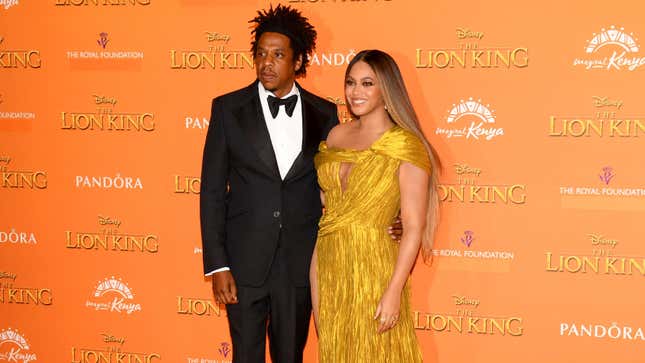
Following the announcement of their new Tiffany campaign, the Carters are bringing their philanthropic efforts to five HBCUs, with the intent to further students’ education in creative fields such as writing, music, theater, film and the arts. The scholarships, initially teased along with the short film for the campaign (h/t E! Online), are going toward five smaller state schools that aren’t always given the same amount of attention as other, larger HBCUs: Lincoln University in Pennsylvania, Norfolk State University in Virginia, Bennett College in North Carolina, University of Arkansas at Pine Bluff and Central State University in Ohio, per Variety. Students must fit a set of financial parameters in order to apply; applications are open from September 10 - September 26.
“We would like to thank the Shawn Carter Foundation, BeyGOOD, The Carters and the Tiffany & Co. family for including Lincoln University in this amazing gift,” Dr. Brenda A. Allen, president of Lincoln University said in a statement (h/t CNN). “Lincoln has placed a high priority on supporting the arts and humanities on our campus. Providing financial support for students pursuing these majors enhances their ability to more fully engage their studies.”
Beyoncé and Jay-Z are no strangers to supporting HBCUs. In the spring of 2019, Jay-Z brought a group of high school students on a bus tour of HBCUs to expose them to opportunities they may not have had otherwise (h/t Complex). Beyoncé’s Homecoming performance at Coachella in 2018 marked the first time a Black woman had ever headlined the music festival and celebrated and honored HBCUs and the significance of Black Greek life.
But we’re going to crunch some numbers here: LMVH, Tiffany’s parent company has a net worth of over $300 billion, not to mention the net worth of Jay and Bey themselves, so a $2 million scholarship is a drop in a very large bucket, according to Forbes. Especially if you consider the 128.54-carat yellow diamond Bey was spotted wearing in the “About Love” campaign. The necklace had only ever been seen on three women before her, and she was—breaking all stereotypes as usual—the first Black woman to wear it.
There has been growing controversy over the campaign, which has only increased tenfold as the news of the scholarship has emerged. The Tiffany Diamond, which Bey is seen wearing, was mined in South Africa under British rule, causing many of people to call out Queen Bey for wearing a blood diamond in her campaign (h/t E! Online), and understandably so. (Though it’s also fair to note that the necklace’s previous three wearers—all white women—seemingly faced no such criticism).
Per NBC News:
The United Nations defines a blood diamond, or conflict diamond, as a gem mined in a war zone and used by militias and warlords to finance their operations. Meanwhile, Tiffany states on its website that the company has “a zero-tolerance policy toward conflict diamonds, and source our diamonds only from known sources and countries that are participants in the Kimberley Process.”
The gem is approximately 144 years old and probably wasn’t as controversial when it was unearthed a century, but the conversation about its ethics is important to have now. So while technically the diamond was mined by a citizen of a country that had colonized South Africa, it’s still clear that the Tiffany Diamond is a conflict diamond, if not a blood diamond. The Washington Post columnist Karen Attiah writes, “Beyoncé’s decision to wear a symbol of White plunder [is jarring]...in the Black Is King visual album, she was proclaiming her love for the continent—its people, aesthetic and music. Then again, she was making that project for us. The Tiffany ad seems clearly aimed at impressing wealthy, whiter consumers.”
This has been an ongoing controversy and conversation since the campaign launched on August 23. The new scholarship efforts designed by Tiffany and the Carters were announced alongside the original campaign release, but to paraphrase NBC News’ headline, what are they really selling? If the controversy surrounding the diamond doesn’t seem to die down, it will be interesting to see what philanthropy is incorporated into their partnership with Tiffany moving forward.

